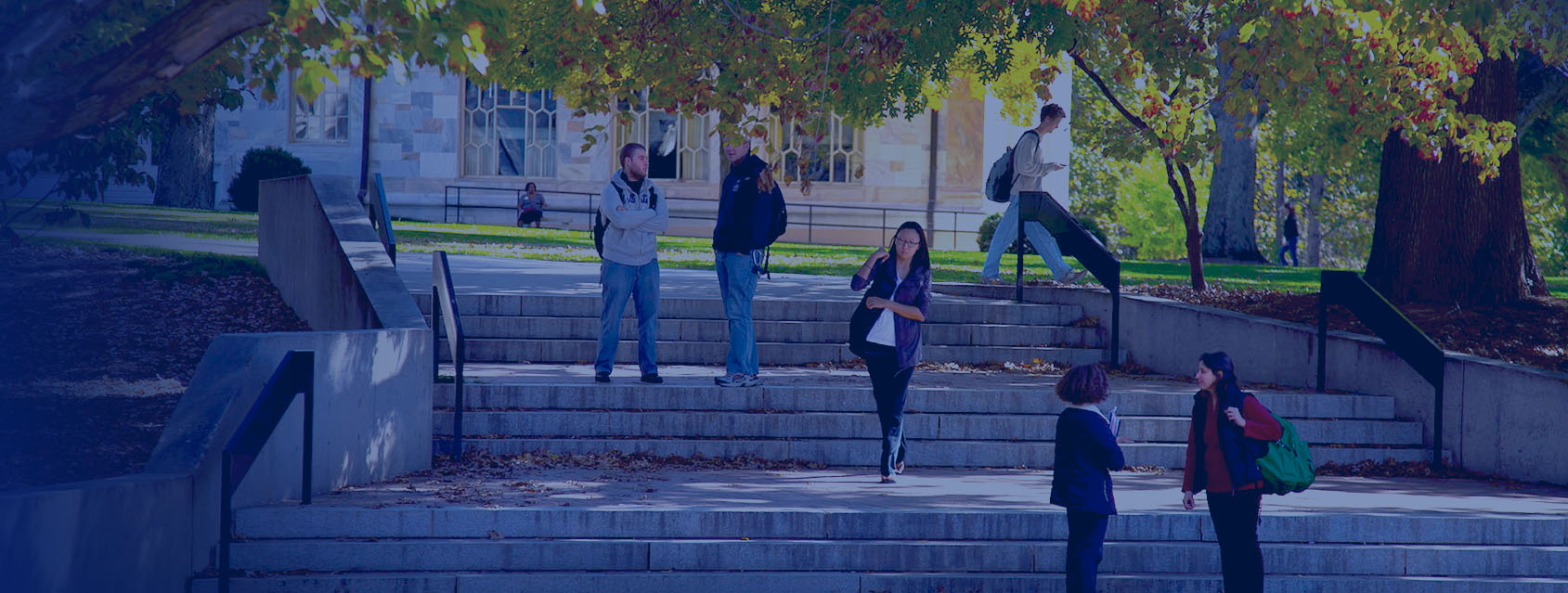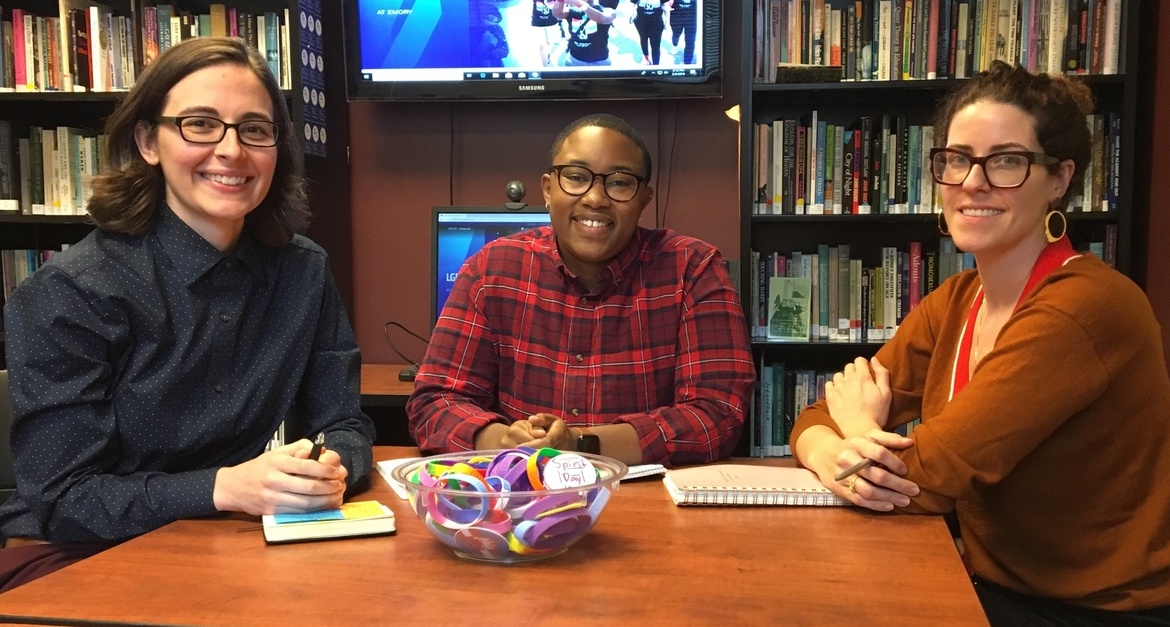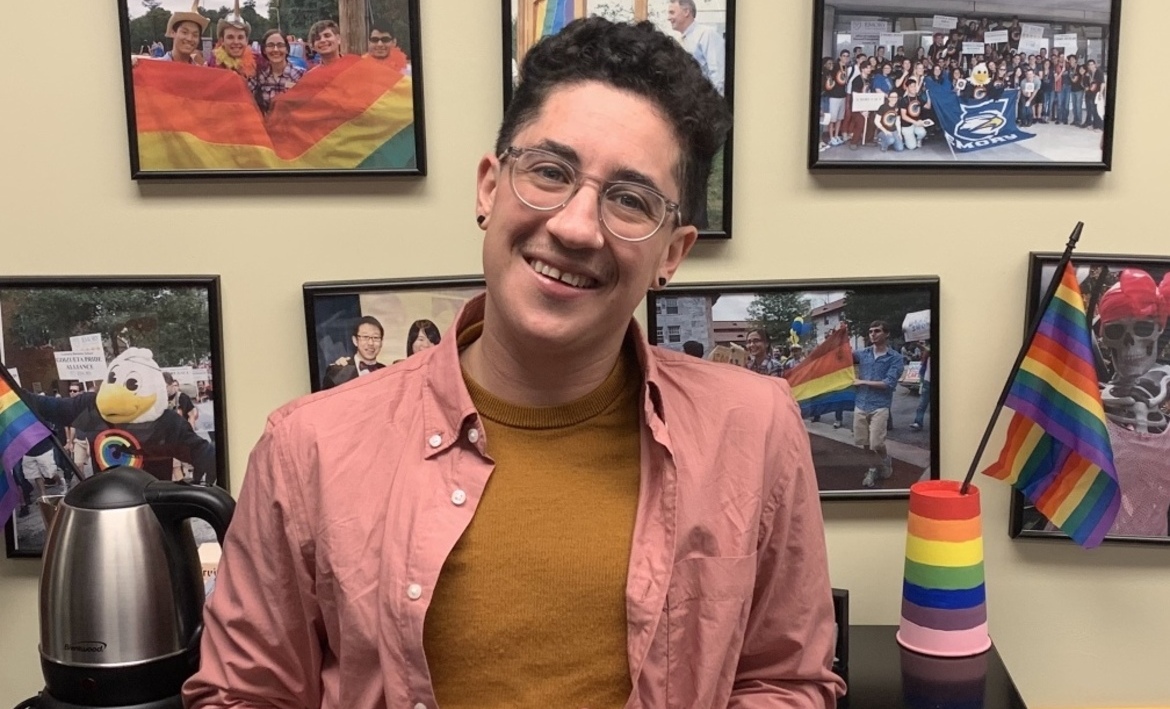
February 13, 2019
LGBT Life is building on its success to expand its role as a campus hub of support for the population that it primarily serves.
By S.A. Reid, Contributing Writer, Campus Life
Emory’s Office of Lesbian, Gay, Bisexual, and Transgender (LGBT) Life is well known as a first stop for students new to the university, especially those seeking various support services and assistance on campus.
LGBT Life, a unit of Campus Life, is building on its success to date to expand its role as a campus hub of support for the population that it primarily serves.
Among its goals, the office will provide LGBTQ students with increased opportunities to connect with LGBTQ faculty and staff outside the classroom for mentoring and other assistance. As mentors, for example, faculty and staff can model for students what it’s like to be out at Emory and how to best navigate that space.
“I just think it’s helpful for community building for students to know that there are out faculty and staff on campus,” said Megan Pendleton, Office LBGT Life assistant director. “And it’s important for them to not just see faculty and staff names on a list but to be able to interact with them.”
 Office of LGBT Life staff. From left, Danielle Bruce-Steele, Megan Pendleton, Natalie Turrin. Photo by JB Brown.
Office of LGBT Life staff. From left, Danielle Bruce-Steele, Megan Pendleton, Natalie Turrin. Photo by JB Brown.
“Not much more exists to bridge the gap between LGBTQ students and faculty, so any effort to create more opportunity and space for that purpose is much needed and would be well received,” said Rivas-Triana, a student worker and junior anthropology major.
According to Danielle Bruce-Steele, director of the offices of LGBT Life and Belonging and Community Justice, “LGBT Life will continue its commitment to explore ways to better engage faculty and staff in the office’s work and facilitate connections between students and those who teach them.”
Bruce-Steele added that LGBT Life’s plans align well with the university’s One Emory Strategic Plan, which calls for engaging students with faculty and staff outside the classroom to cultivate a thriving campus, underpin a compelling student experience, and enhance the university’s role as an academic community of choice.
 Ashley Rivas-Triana, 20C. Photo by JB Brown.
Ashley Rivas-Triana, 20C. Photo by JB Brown.
“Safe Space is an educational training initiative that increases awareness of issues affecting LGBT communities, knowledge of the laws and policies that affect their lives, and the tools for how to take action in participants’ spheres of influence,” Turrin explained.
Tim Holbrook, a law professor serving as vice provost for faculty affairs, exemplifies engagement with students. LGBT Life’s leadership gives him high marks for, among other things, his efforts to advance queer equality and the concerns of the transgender community.
LGBTQ students, Holbrook says, often feel vulnerable because of the discrimination and the obstacles to their success that they experience in their daily lives and the need to feel that they are welcomed and valued.
“That’s why it’s important for faculty to have a level of engagement that lets them know we celebrate who they are, helps them to feel part of the larger community, and gives them the confidence to reach their potential,” he added.

In addition to creating more opportunities for student-faculty interaction and mentoring, LGBT Life also is looking to improve student engagement with the greater Atlanta LGBTQ community. Expanding office staffing and finding ways to connect with and better serve queer and transgender students of color and women are additional goals.
“How do we do that better and what could that look like? That’s something else we have a chunk of time and energy carved out for,” Bruce-Steele explained. “For example, a small first step toward engaging with Atlanta and growing our community is our first-ever Pride Prom, hosted on March 22 in Cox Hall.”
Pendleton agrees. “The Pride Prom will give LGBTQ students, faculty, and staff at Emory and other area colleges an opportunity to connect, socialize, and enjoy a positive prom experience that many have been denied,” said Pendleton.
“Many LGBTQ folks encountered hostile prom experiences in high school, were denied access, or chose not to attend in fear,” she added. “Participants in the Pride Prom can share a social experience with others as their most authentic selves.”
With a number of wins for the LGBTQ community in recent years, Bruce-Steele is quick to point out that partnerships are essential to progress.
“Usually, we bring issues to people with influence and work with them to solve those issues,” she explained. “We’ve partnered with a range of offices and departments throughout Emory to establish policies and best practices for preferred names, gender-inclusive housing, transgender student participation in club and intramural sports, hormonal replacement therapy at Student Health Services, and easier access to PreP, an HIV prevention drug.”
Although LGBT Life has not made significant headway on gender-inclusive bathrooms, according to Bruce-Steele, change is on the horizon. “We are excited that the new Emory Student Center will have one of the first multi-stall gender-inclusive restroom on campus,” she added. “However, we’re still working to convert other gendered single-user restrooms to gender-inclusive bathrooms with inclusive signage.”
LGBT Life’s signature initiatives include the Queer Discussion Group Program, which brings students together for weekly talks led by trained facilitators, and the Pride Awards, which recognize faculty, staff, students, and departments for their contributions to the LGBTQ community. Every year, the office organizes the Emory contingent for the Atlanta Pride Parade.
Above all, the office provides a safe and comfortable space where students can participate in programs, study, watch TV, grab a snack, or nap on the couch.
What makes the Office of LGBT Life truly special is the commitment of Bruce-Steele, Pendleton, Turrin, and other staff members to making the LGBTQ student experience at Emory a positive one, according to Sasha Cohen, a graduate nursing student who began working in the office as an undergraduate.
“I think having a community space where you feel safe to be yourself is essential,” says Cohen who identifies as transgender, non-binary. “I have seen some really beautiful interactions there.”
Although the Office of LGBT Life considers itself a primary source of support for Emory’s LGBTQ students, it engages on a continuing basis with the related work of other organizations with shared goals. In the spirit of One Emory, Bruce-Steele welcomes such partnerships and suggests that her office is the resident expert that could help bring those efforts together.
“We’re always happy to be the conduit,” she adds. “I think people see us as a resource for students, but we’re also a resource for faculty and staff seeking to create more inclusive spaces for their students and colleagues.”
Learn more
Office of LGBT Life: http://www.lgbt.emory.edu/
Safe Space: http://www.lgbt.emory.edu/get-involved/programs-events/safe-space.html
2019 Pride Awards, Mar. 5: https://www.engage.emory.edu/s/1705/alumni/index3.aspx?sid=1705&pgid=8744&gid=3&cid=13511&ecid=13511&post_id=0
Out at Emory: http://www.lgbt.emory.edu/resources/campus/who.html